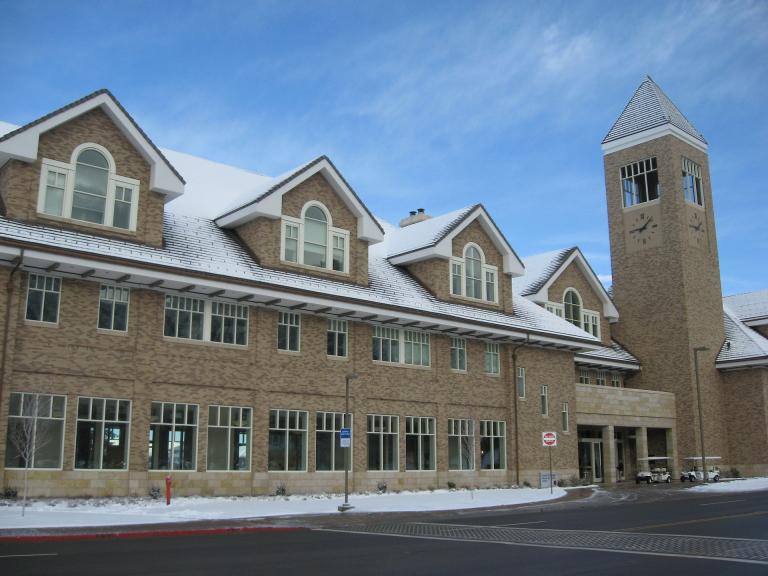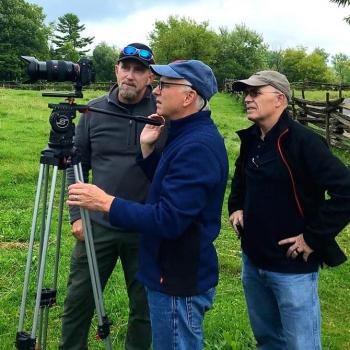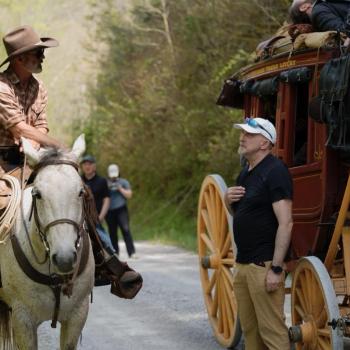
Continuing with some thoughts on the subject:
Frankly, men tend to dominate apologetics because men are more inclined to be combative and more interested in certain styles of dispute. This really isn’t open to question, I think. It shows up in international politics, in crime statistics, in sports, and so forth. It appears already in children, when boys roughhouse and make weapons out of sticks while girls . . . play in other ways. (I’m trying to avoid political incorrectness here.) I saw a cartoon once — I haven’t been able to find it today — in which a husband is indicating how he and his wife divide up the responsibilities in their ordinary middle class home; his wife manages the house, the family budget, the family diet, the education of the children, vacation planning, and the like, while he concentrates on government economic policy, presidential politics, and appointments to the Supreme Court. Put another way: my own very level-headed and effective wife finds my more obsessive critics simply ridiculous and can’t figure out why in the world I pay them even the slightest attention.
It’s not all gender-based, of course. I was always amazed, in talking with the late great Richard Lloyd Anderson, to see how serenely unconcerned he was with the harshness of certain criticisms made of him and his work. I would call his attention to some recent attack or other leveled at him, and he would be surprised to hear of it. “Really? Maybe I’ll have to look at that sometime.”
But, of course, testosterone — if that’s a relevant factor here — is more relevant to polemics in particular than to apologetics in general. Apologetic scholarship isn’t necessarily polemical or combative. It has nothing to do, necessarily, with what some are now calling “toxic masculinity.”
So I come to the Interpreter Foundation.
From time to time, certain folks like to criticize today’s Interpreter Foundation because its writers and its leadership are preponderantly male. And this is undeniably true. The critics’ insinuation is that, whether deliberately or out of sheer, unreflective, chauvinistic, patriarchal bias, we exclude women.
The subject has come up again lately because of a specific case involving a woman who apparently volunteered for a time to copyedit some of the manuscripts submitted to us. (We don’t have a “staff.” We have no brick and mortar office. We rely almost entirely upon volunteers.) She was, I’m told, a very good editor. Apparently, though, she backed away from volunteering for us, a few months ago, on the grounds that she was just too busy. And now she’s publicly announced that she’s left the Church. (So far as I can tell, her departure is connected to her stance on gay rights and perhaps on gender issues more broadly. I can’t really say; I don’t know her and have never met or, to the best of my knowledge, interacted with her.)
Is it the policy of Interpreter to exclude women? Absolutely not.
But we can only engage as volunteers people who volunteer to be engaged.
We can only accept and publish manuscripts that have been submitted to us in the first place, and we have no control whatever over who sends work to us for consideration. For a few years, the Interpreter Foundation offered an annual prize designed to encourage female writers. (It was largely, though not entirely, sponsored by my wife and me.) We discovered, though, that the supply of female writing was, as an economist might say, relatively inelastic. If our prize had any effect on the number of submissions from women at all, that effect was negligible. Perhaps things would have been different if the prize had been significantly larger. I can easily imagine, for instance, that an annual prize of a million dollars might have had a measurable impact. But we did what we could.
And we’ve lost several people over the years for various reasons, including a few women. One, a seasoned professional editor who was serving as a volunteer copyeditor, died. (Interpreter’s board of trustees has no jurisdiction in such matters.) Another, whose participation I miss very much, is busily involved these days with a small but very lively toddler and a new baby. (Interpreter’s board of trustees will not demand that she neglect them.)
Even so, we’ve published work by a number of women, and a number of women are involved in our efforts (e.g., managing our peer review, managing our editorial process, volunteering as editors, helping with donor relations, and participating in our scripture roundtables, podcasts, and radio broadcasts).
But we’ve never had as many women involved as we would have liked and we would welcome more manuscript submissions from female writers. Very, very much, in fact. We like articles from a variety of perspectives; they help us to see things that, from our own point of view, we might have missed. And we appreciate input on Foundation decisions from different viewpoints. We impose no barriers whatever based on gender, ethnicity, age, academic background, nationality, place of residence, or preference in breakfast cereals. We’re simply looking to encourage and publish high quality, faithful scholarship.
(To be continued.)












